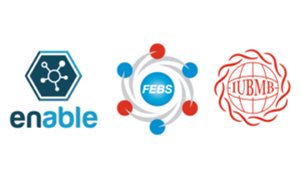
Organized so far by PhD candidates and postdoctoral researchers at IRB Barcelona, RIMLS, CPR and SEMM, the ENABLE conferences will be funded by FEBS (Federation of European Biochemical Societies) and IUBMB (International Union of Biochemistry and Molecular Biology), which guarantee the continuity of future gatherings. The 2022, 2023 and 2025 conferences will be held in Europe while the 2024 event will be held outside Europe.
The ENABLE international conferences, which have been held annually since 2017, are scientific gatherings organized by and for young researchers that seek to ensure the next generation of scientific leaders.
Initially funded by the European Commission's Horizon2020 program, the first four conferences were held in the cities hosting the headquarters of the four entities leading the project: the Institute for Research in Biomedicine (IRB Barcelona) in Barcelona, Spain; the Radboud Institute for Molecular Life Sciences (RIMLS) in Nijmegen, The Netherlands; The Novo Nordisk Foundation Center for Protein Research (CPR) in Copenhagen, Denmark; and the Scuola Europea di Medicina Molecolare (SEMM), in Milan, Italy.
For the next four FEBS-IUBMB-ENABLE events (2022-2025), the Federation of European Biochemical Societies (FEBS) and the International Union of Biochemistry and Molecular Biology (IUBMB), which have sponsored the conferences since 2017, have signed an agreement by which they will fund the organization of the gatherings, thus guaranteeing their continuity.
"ENABLE conferences are a unique opportunity to experience science in a different way. By combining top-notch scientific discussions with career development and public outreach activities, ENABLE empowers young researchers to become the biomedical professionals of tomorrow, " says Gianmarco Di Mauro, organizer of the 1st ENABLE conference (Barcelona 2017).
Learn more about the ENABLE conferences
Associated research centers and intercontinental rotation
In this new cycle of FEBS-IUBMB-ENABLE conferences, in addition to the four core research centers, other international research institutions can apply to become associated centers and host one of the events. Regarding the associated centers, FEBS-IUBMB-ENABLE will look for one in a non-European country to ensure that one of the conferences is held on another continent.
ENABLE (now FEBS-IUBMB-ENABLE) conferences are international and interdisciplinary meetings involving audiences from a variety of backgrounds, cultures and generations. The incorporation of associated research centers allows further enrichment of the FEBS-IUBMB-ENABLE conference programs and provides greater added value, both for the PhD candidates participating in the Organizing Committee and those attending the events.
The essence of FEBS-IUBMB-ENABLE conferences
The FEBS-IUBMB-ENABLE conferences are organized by a Scientific Committee composed of young researchers (PhDs and postdocs) from several European institutions and members from FEBS and the IUBMB Young Scientists Forum (YSF).
The annual ENABLE conference includes a scientific symposium, addressing current issues in molecular life sciences, and a series of activities focused on providing guidance on employment opportunities. FEBS-IUBMB-ENABLE also seeks to engage the general public through outreach events.
Partners
Related news items

Joint research in regional hospitals New research projects from promotion fund
22 November 2022Four research projects have been honored in the promotion fund of the Radboudumc and four regional hospitals. The research projects, which are a collaboration between CWZ, Jeroen Bosch Hospital, Rijnstate, Sint Maartenskliniek and the Radboudumc will receive a contribution of 240,000 euros.
go to page
Trained immunity’s role in kidney disease
17 November 2022Researcher(s) Jordi Ochando of the Icahn School of Medicine at Mount Sinai in New York and Raphaël Duivenvoorden of the Department of Nephrology at Radboudumc explain how trained immunity can have detrimental effects in kidney disease and transplantation.
go to page



